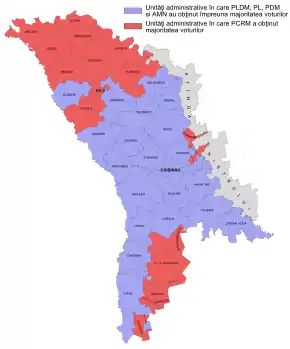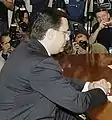Alliance for European Integration
The Alliance for European Integration (Romanian: Alianța pentru Integrare Europeană) was the centre-right anti-communist ruling coalition in Moldova from the July 2009 election until it lost a no confidence vote on February 13, 2013. It was succeeded by the anti-communist Pro-European Coalition.
| Dissolved | February 13, 2013 |
|---|---|
| Type | Centre-right Ruling Coalition |
| Purpose | Governing in Moldova |
| Headquarters | Chişinău |
Key people | Vlad Filat Mihai Ghimpu Marian Lupu Serafim Urechean |
Overall context
After the April 2009 election and the civil unrest, the climate in Moldova became very polarised.[1] The parliament failed to elect a new president. For this reason, the parliament was dissolved and snap elections were held. The July 29 polls were won by the Communist Party with 44.7% of the vote. That gave the former ruling party 48 MPs, and the remaining 53 seats in the 101-member chamber went to four opposition parties. 51 votes are needed to elect the speaker and prime minister, and 61 votes to elect the president.
Membership
After the July 2009 elections, the centre-right anti-communist alliance was formed by the following parties: Liberal Democratic Party (18 seats), Liberal Party (15 seats), Democratic Party (13 seats), and Our Moldova Alliance (7 seats). On August 8, 2009, the four Moldovan parties agreed to create a governing coalition that pushed the Communist party into opposition; the Communists had been in government since 2001. The name of the coalition is the "Alliance for European Integration". On 25 September 2009, the Alliance for European Integration has voted a pro-European government.[2]
| Political forces | Seats | Moldovan Parliament seats after July 2009 polls | ||||||||||||||||||||||||||||||||||||||||||||||||||||
|---|---|---|---|---|---|---|---|---|---|---|---|---|---|---|---|---|---|---|---|---|---|---|---|---|---|---|---|---|---|---|---|---|---|---|---|---|---|---|---|---|---|---|---|---|---|---|---|---|---|---|---|---|---|---|
| Alliance for European Integration (Right-wing) | 53 | |||||||||||||||||||||||||||||||||||||||||||||||||||||
| Party of Communists (Left-wing) | 48 | |||||||||||||||||||||||||||||||||||||||||||||||||||||
| ||||||||||||||||||||||||||||||||||||||||||||||||||||||
After the 2010 elections, the centre-right anti-communist alliance increased its majority from 53 seats to 59 seats. Although the Our Moldova Alliance did not return to parliament, the leaders of the three remaining parties of the alliance pledged signed a new coalition agreement on 30 December 2010. The new cabinet was installed on 14 January 2011, when an investiture vote took place in parliament.[3][4]
| Political forces | Seats | Moldovan Parliament seats after 2010 polls | ||||||||||||||||||||||||||||||||||||||||||||||||||||||||||
|---|---|---|---|---|---|---|---|---|---|---|---|---|---|---|---|---|---|---|---|---|---|---|---|---|---|---|---|---|---|---|---|---|---|---|---|---|---|---|---|---|---|---|---|---|---|---|---|---|---|---|---|---|---|---|---|---|---|---|---|---|
| Alliance for European Integration | 59 | |||||||||||||||||||||||||||||||||||||||||||||||||||||||||||
| Party of Communists | 42 | |||||||||||||||||||||||||||||||||||||||||||||||||||||||||||
| PCRM (42) · PLDM (32) · PDM (15) · PL (12) | ||||||||||||||||||||||||||||||||||||||||||||||||||||||||||||
Goals
 |
|---|
| This article is part of a series on the politics and government of Moldova |
| Administrative divisions |
|
|
The leaders of the four parties – Vlad Filat, Mihai Ghimpu, Marian Lupu, and Serafim Urechean – signed the 22-point declaration of the Alliance in a news conference on Saturday, August 8, 2009.
The Liberal Democratic Party, Liberal Party, Democratic Party, and Our Moldova Alliance have committed themselves to achieving such goals as overcoming the social and economic crisis and ensuring economic growth, reintegrating territories, European integration and promoting a balanced, consistent and responsible foreign policy. The coalition said it wants an association agreement with the European Union. Also, the coalition said it wants strategic relations with both Russia and the United States.
In a press conference on October 21, 2009, Iurie Leancă announced that official negotiations on the association agreement Moldova-EU will start on January 12, 2010.
Commission for constitutional reform in Moldova is a commission instituted on December 1, 2009 by acting President Ghimpu to adopt a new version of the Constitution of Moldova (1994).
On January 14, 2010 President Mihai Ghimpu instituted the Commission for the Study of the Communist Dictatorship in Moldova for studying and formulating a historic assessment of the totalitarian communist regime.
Moldovan Parliament
The first session of Moldova's parliament was scheduled for August 28, one day short of the deadline for the body to convene.
On August 28, 2009, Mihai Ghimpu was elected as the Speaker of the Moldovan Parliament, through secret voting, getting all 53 votes of the Alliance For European Integration.[5][6]
Mihai Ghimpu on August 28, 2009: "I thank my colleagues for their trust. I hope that while in this post I will cooperate for a free press, independent legal system, and a state of law of which all the Moldovan citizens will be proud."[7]
Prime Minister of Moldova
Constitutional Court of Moldova confirmed the legitimacy of Mihai Ghimpu's position as acting president, which gave him the right to nominate a prime minister. On the same day, Ghimpu signed a decree nominating Filat for the office of prime minister. Earlier on September 17, the parliament approved a new government structure; according to the draft structure, the number of ministries remains unchanged at 16 but their names and responsibilities have been changed.
The Alliance cabinet of Vlad Filat took office after winning the approval of parliament on September 25, 2009.[8][9] Filat said that his first official visit as premier will be made to Brussels. He added that the agenda of the first official meetings will include visits to Paris, Berlin, Bucharest, and Kyiv.[10]
President of Moldova
On September 11, 2009, Mihai Ghimpu became the acting president of Moldova.[11] The interim position was possible following the resignation of Moldovan President, Vladimir Voronin, announced in the morning of 11 September 2009 on the public broadcaster Moldova 1.[12]
The resignation letter was sent to the Parliament secretariat and by a vote of 52 deputies in the plenary session of the legislature was declared vacant the post of the President of the Republic of Moldova. Therefore, in accordance with Article 91 of the Constitution of 1994, which provides that "the responsibility of the office shall devolve ad interim on the President of Parliament or the Prime Minister, in that priority order", Mihai Ghimpu becomes the interim President of the Republic of Moldova until a new president will be elected by the Parliament.
One of the goals of the Alliance is to elect the new president. The candidate of the Alliance is Marian Lupu.
The four parties need to elect a new president which will be impossible without having the support of at least 8 Communist MPs. The Communists can decide to block the election of the new president, which will mean that Vladimir Voronin (who resigned on September 11 and Mihai Ghimpu took over as interim) will stay on as acting president until new (early) elections next year.
The critics close to the Communists said that the new coalition was in fact a resurrection of the former Alliance for Democracy and Reforms, which had failed in its attempt to rule.[13] After 1999, the Party of Communists used very successfully the incoherent activity of the Alliance for Democracy and Reforms for the discreditation of any form of political coalition formed without Communists.
Issues
Soviet Occupation Day
Mihai Ghimpu, interim president of Moldova in 2010, decreed June 28 as Day of Soviet Occupation and Commemoration of the Victims of the Communist Totalitarian Regime[14][15][16] to remember the Soviet occupation on June 28, 1940.[17] The move was met with disapproval and calls for the decree's revocation inside the ruling coalition, and with calls for Ghimpu's resignation among the opposition parties. Dorin Chirtoacă, mayor of Chişinău and member of the same party as Ghimpu, ordered the erection of a memorial stone in the National Assembly Square, in front of the parliament building, where a Lenin monument used to stand.[18] The members of the coalitions argued that the time had not come for such a decree and that it would only help the communists win more votes.[19] The Academy of Sciences of Moldova declared that "in the view of recent disagreements regarding June 28, 1940 [...] we must take action and inform the public opinion about the academic community views". The Academy declared that: "Archival documents and historical research of international experts shows that the annexation of Bessarabia and Northern Bukovina was designed and built by Soviet Command as a military occupation of these territories. Ordinance of Interim President Michael Ghimpu reflects, in principle, the historical truth".[20] But the Constitutional Court cancelled Ghimpu's decree on July 12, 2010.[21][22]
Constitutional referendum
The constitutional referendum aimed at breaking the political stalemate failed on September 5, 2010, following a low voter turnout.[23][24] No further referendum can be called to change the constitution for direct elections of the president for another two years. The head of the observer mission from the Parliamentary Assembly of the Council of Europe, Andreas Gross, praised the referendum as being well organised and corresponding to democratic standards.[25]
On 15 January 2012, the leaders of the Alliance made a joint statement announcing that a constitutional referendum would be held in April 2012. Prime Minister Vlad Filat said that "a referendum on the amendment of the constitution will be initiated in order to give people the opportunity to rectify the constitutional deficiencies that have been triggering endless political crises." Acting President Marian Lupu added that: "Moldova's president will be elected within a month after the validation of the referendum's outcome.". Liberal leader Mihai Ghimpu then said that the amendment to the constitution is the only solution to the political crisis.[26][27]
2010 election
After the referendum failed, the Alliance announced on September 6 that it would consult the Constitutional Court of Moldova on dissolving parliament and holding a new election.[28]
See also
Gallery

 Total votes won by the opposition parties (PL, PLDM, AMN) which passed the 6% electoral threshold in the April 2009 election by raion and municipality
Total votes won by the opposition parties (PL, PLDM, AMN) which passed the 6% electoral threshold in the April 2009 election by raion and municipality


References
- The New York Times, A Polarized Moldova Votes, Mindful of West and Russia, July 29, 2009
- UNIMEDIA – Moldova's new cabinet to face investiture vote on September 25
- Sofia Echo – Moldova's new cabinet to face investiture vote on January 14
- UNIMEDIA – New cabinet Filat 2
- Politicom.Moldova.org: Moldovan Pro-Western coalition elects new speaker of the parliament Archived 2009-08-31 at the Wayback Machine
- New York Times: Moldova Elects New Speaker After Communist Walk – Out
- "Mihai Ghimpu elected Speaker". Retrieved 25 February 2015.
- "BBC News – Moldova gets new pro-Western PM". Retrieved 25 February 2015.
- "Moldova Gets Government, Eyes Integration In Europe". RadioFreeEurope/RadioLiberty. Retrieved 25 February 2015.
- Bucharest on the agenda of Vlad Filat’s first official visits
- ITAR-TASS: Mihai Ghimpu appointed Moldovan acting president Archived 2009-09-16 at the Wayback Machine
- "Moldova's President announced his resignation". HotNewsRo. Retrieved 25 February 2015.
- "Moldova's four pro-western parties set up governing coalition_English_Xinhua". Retrieved 25 February 2015.
- "Archived copy". Archived from the original on 2010-07-04. Retrieved 2012-03-08.CS1 maint: archived copy as title (link)
- Vladimir Socor, Moldovan Government Chickens out of Historical Assessment of Communism
- "În fiecare an, pe 28 iunie, Moldova va comemora Ziua ocupaţiei sovietice şi victimele regimului totalitar comunist". PUBLIKA.MD. 25 February 2015. Retrieved 25 February 2015.
- Vladimir Socor, Russia Defends Soviet Occupation of Moldova
- "Primăria a instalat în faţa Guvernului o piatră în memoria victimelor regimului comunist". PUBLIKA.MD. 25 February 2015. Retrieved 25 February 2015.
- "Archived copy". Archived from the original on 2011-07-25. Retrieved 2010-07-21.CS1 maint: archived copy as title (link)
- http://unimedia.md/?mod=news&id=20961
- "Moldovan Leader: Court Ruling Against 'Soviet Occupation Day' Was Political". RadioFreeEurope/RadioLiberty. Retrieved 25 February 2015.
- Moldpres, Moldovan top court says presidential decree on Day of Soviet Occupation unlawful Archived 2011-07-22 at the Wayback Machine
- Reuters, Moldovan referendum appears to flop on low turnout
- Aljazeera.com, Moldova referendum scuttled
- Moldova faces new crisis after referendum debacle
- Moldpres, Moldovan ruling alliance wants to amend constitution via referendum
- Jurnal de Chişinău, AIE inițiază un referendum național pentru modificarea Constituției! Archived 2012-01-20 at the Wayback Machine
- Balmforth, Richard. "Moldova's Rulers to Call Election after Poll Flop | Reuters." Business & Financial News, Breaking US & International News | Reuters.com. Ed. Mark Trevelyan. Reuters, 06 Sept. 2010. Web. 06 Sept. 2010. <https://www.reuters.com/article/idUSLDE6851HJ20100906>.


